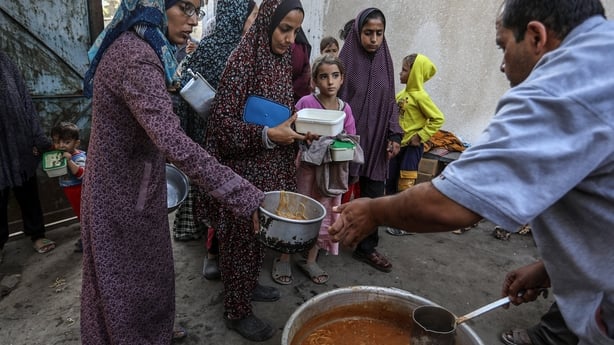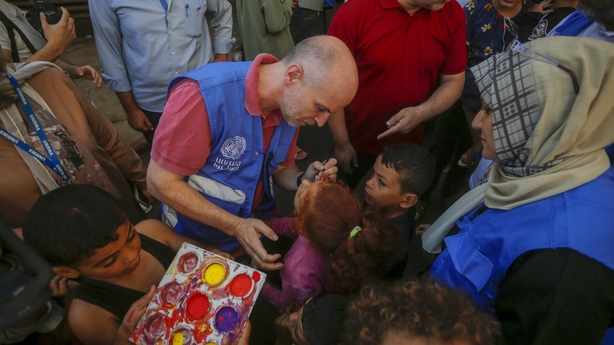The UN Palestinian refugee agency has said it is close to a possible breaking point for its operations in the Gaza Strip due to increasingly complicated conditions.
"I will not hide the fact that we might reach a point that we won't be able anymore to operate," UNRWA chief Philippe Lazzarini told journalists at a news conference in Berlin.
"We are very near to a possible breaking point. When will it be? I don't know. But we are very near of that," he said.
It comes as more than 150,000 children in Gaza received the required second dose of oral polio vaccine in the first two days of the campaign's second round, the WHO chief has said.
Despite continuing Israeli military operations in some areas of the Palestinian territory, the second round of a polio vaccination campaign, aiming to reach more than 590,000 children under the age of 10, began on Monday.
"The total number of children who received a second dose of polio vaccine in central Gaza after two days of vaccination is 156,943," the World Health Organization's director-general Tedros Adhanom Ghebreyesus said on X.

"The vaccination continues today. At the same time, 128,121 children received vitamin A supplements.
"We call for the humanitarian pauses to continue to be respected. We call for a ceasefire and peace," he said.
As during the initial round of vaccination last month, the second will be divided into three phases, helped by localised "humanitarian pauses" in the fighting: first in central Gaza, then in the south and finally in the hardest-to-reach north of the territory.
Each phase is due to take three campaign days, along with one catch-up day for monitoring and vaccinating any children who were missed.
The vaccination drive began after the Gaza Strip confirmed its first case of polio in 25 years.
The disease has re-emerged in besieged Gaza, where the war has left most medical facilities and the sewage system in ruins.
Most often spread through sewage and contaminated water, poliovirus is highly infectious. It can cause deformities and paralysis, and is potentially fatal, mainly affecting children under the age of five.
WHO spokesman Tarik Jasarevic told reporters yesterday that nearly 93,000 doses had been administered in central Gaza on the first day, which he said passed "without major issues".
The estimated target for the central area is over 179,000 children under 10.
"We hope that parents will keep coming," Mr Jasarevic said.

Meanwhile the UK and France have called an urgent meeting at the United Nations Security Council to discuss the humanitarian situation in Gaza.
UK Prime Minister Keir Starmer said that his country was considering sanctioning two Israeli ministers, finance minister Bezalel Smotrich and national security minister Itamar Ben-Gvir over comments they had made about the conflict.
Reuters reported earlier this month that food supplies to Gaza had fallen sharply in recent weeks after Israeli authorities introduced a new customs rule, and the US said the humanitarian situation must improve or Israel could face potential restrictions on US military aid.
"We are constantly making representations on this with our partners," Mr Starmer told parliament.
"There is an urgent need, and has been now for a very long time, for more aid to get into Gaza."
British Foreign Secretary David Lammy said in a statement that Israel must ensure civilians were protected and routes were open to allow life-saving aid through, and that the United Nations meeting would address these issues.
He said Algeria had also joined the call for the urgent meeting.
Israel launched a military campaign in Gaza after the October 7, 2023, attack by Hamas resulted in the deaths of 1,206 people in Israel, mostly civilians, according to an AFP tally of official Israeli figures, including hostages killed in captivity.
The Israeli campaign has killed 42,409 people, the majority civilians, according to figures from the health ministry in the Hamas-run territory which the UN considers reliable.
As some Western countries have been pushing for a ceasefire in Gaza, Mr Natanyahu and his far-right government have rejected ceasefire calls and has vowed to crush Hamas.

